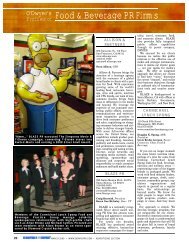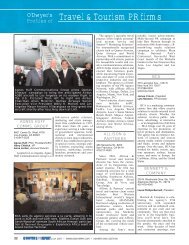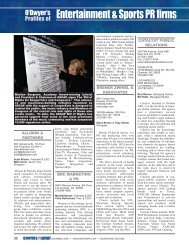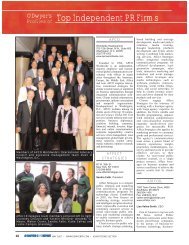PR Firm Rankings - Odwyerpr.com
PR Firm Rankings - Odwyerpr.com
PR Firm Rankings - Odwyerpr.com
Create successful ePaper yourself
Turn your PDF publications into a flip-book with our unique Google optimized e-Paper software.
FEATURE<br />
Privacy ranks as top online ethical challenge<br />
Business ethics has always been a touchy subject for corporate<br />
<strong>com</strong>munications practitioners and their <strong>PR</strong> firm counterparts. In<br />
today’s digital world, maintaining a high level of business ethics<br />
online is be<strong>com</strong>ing a bigger challenge than ever for the corporate<br />
<strong>com</strong>munications professional.<br />
By Patrick Di Chiro<br />
To be sure, <strong>PR</strong> professionals had to<br />
contend with plenty of thorny ethical<br />
issues in the old, pre-digital<br />
days. Whether it was financial malfeasance,<br />
sexual harassment, or the propriety<br />
of doing business with foreign dictators,<br />
corporate <strong>com</strong>municators have never<br />
wanted for things to do when it came to<br />
managing issues and crises related to business<br />
(and personal) ethics.<br />
The media is flooded with news of the<br />
alleged ethical transgressions of Toyota,<br />
not to mention the mightiest of Wall Street<br />
banks, Goldman Sachs, which has been<br />
sued by the SEC.<br />
On the web, however, there is a whole<br />
new set of ethical temptations and landmines<br />
that are posing new, <strong>com</strong>plex challenges<br />
to corporate <strong>com</strong>municators. I wonder<br />
sometimes if we are sufficiently aware<br />
of these new problems that threaten our<br />
<strong>com</strong>panies and, more importantly, our<br />
consumers, customers and stakeholders. I<br />
also question if we are adequately prepared<br />
to deal with them.<br />
One of the biggest ethical issues facing<br />
<strong>com</strong>panies and organizations today is privacy<br />
online. This is especially true for<br />
web-based <strong>com</strong>panies that frequently<br />
operate with a “Wild West” mentality.<br />
That can lead to online firms treating concerns<br />
like business ethics as an “old<br />
world” problem that does not really apply<br />
to them.<br />
The fact is that web privacy is a massive<br />
and growing problem, one that has caught<br />
the urgent attention of both consumers and<br />
regulators around the world. The emerging<br />
ethical conundrum for corporate <strong>com</strong>municators<br />
is: Do we call out our <strong>com</strong>panies<br />
and clients on questionable web privacy<br />
practices, or do we just look the other way,<br />
believing this is just how business is done<br />
on the Internet these days<br />
Some <strong>com</strong>panies (most notably<br />
Facebook) have really pushed the limits of<br />
privacy. The <strong>com</strong>pany’s CEO, Mark<br />
Zuckerberg, has suggested that people<br />
today (especially those in the younger<br />
cohorts) don’t mind if their information is<br />
shared liberally — and without their<br />
authorization.<br />
A newly released study from UC<br />
Berkeley found that young people are just<br />
as leery about privacy (and sharing too<br />
much of their personal information) as<br />
their parents. The study found that 82% of<br />
respondents 18-24, and 84% 25-34, said<br />
they have refused to provide information<br />
to <strong>com</strong>panies because they felt it was too<br />
private or not necessary. That <strong>com</strong>pares<br />
with 85% of survey respondents over 65<br />
years of age. Virtually the same views on<br />
privacy amongst young and old alike.<br />
There are others who strenuously disagree,<br />
arguing we live in an era where people<br />
happily “over-share” on the web.<br />
Whether it’s what you just bought at the<br />
mall or what bar you are now drinking in,<br />
the argument is that many of us just love<br />
broadcasting to the world every minute<br />
detail of our lives. A crop of new web start<br />
ups (with names like Blippy, foursquare<br />
and Swipely) are now banking on what<br />
they view as this growing <strong>com</strong>fort level<br />
with little to no privacy.<br />
The business models of these new web<br />
players will likely focus on selling the data<br />
gained from their over-sharing users, and<br />
even taking <strong>com</strong>missions on sales of products/services<br />
to their friends. One has to<br />
wonder where all of this is going from a<br />
privacy standpoint. It’s easy to imagine<br />
some potential security and ethics-related<br />
train wrecks in the offing.<br />
In April, 10 countries went after Google<br />
because of that Internet giant’s sometimes<br />
sketchy privacy policies. Google shot<br />
itself in the foot a couple of months ago<br />
when it launched its Buzz social networking<br />
product. Google thought it was doing<br />
Gmail users a favor by pre-populating<br />
their Buzz profiles with the names of people<br />
they emailed frequently. It was a serious<br />
privacy breach that Google first tried<br />
to deny and then had to back-peddle on<br />
because of the global avalanche of criticism<br />
it faced.<br />
Here’s a question: Did Google’s corporate<br />
<strong>com</strong>munications team review the new<br />
Buzz privacy policies before the product<br />
was launched If not, it should have done<br />
so. If it reviewed the policies first, then<br />
Google’s corporate <strong>com</strong>munications team<br />
was asleep at the switch.<br />
Clearly, privacy is a big and growing<br />
issue for <strong>com</strong>panies and organizations of<br />
all types and sizes today. Privacy is a ticking<br />
time bomb of business ethics that represents<br />
an historic challenge for corporate<br />
<strong>com</strong>municators. What matters is that we<br />
try to make sure that our <strong>com</strong>panies and<br />
clients always respect web privacy in<br />
everything they do, so the problems don’t<br />
arise in the first place.<br />
There are other web related ethical<br />
issues that go beyond the critical concern<br />
of keeping personal information private<br />
and secure. A particularly egregious example<br />
relates to the questionable and widely<br />
employed practice of “opt-out” marketing<br />
on the web. Zynga, the fast growing online<br />
gaming <strong>com</strong>pany, has been a big abuser of<br />
this aggressive and misleading marketing<br />
approach.<br />
You may recall how Zynga was caught<br />
trapping unsuspecting users into signing<br />
up for expensive subscriptions without<br />
their knowledge. This ethical transgression<br />
also caught Facebook in its undertow,<br />
as Zynga does the majority of its business<br />
on Facebook, pushing games like<br />
Farmville and Mafia Wars. Both Zynga<br />
and Facebook denied any wrongdoing, but<br />
promised to do better in the future.<br />
Corporate <strong>com</strong>munications professionals<br />
cannot just ignore these issues and<br />
hope they disappear. Sure, it’s the <strong>com</strong>pany’s<br />
responsibility to stay on the straight<br />
and narrow path with respect to ethical<br />
business practices on the web (and offline,<br />
too). But, a major portion of the onus is<br />
rightly on corporate <strong>com</strong>munications people<br />
(and their <strong>PR</strong> agency advisors) to<br />
counsel management and clients against<br />
these ethical lapses. That includes convincing<br />
their <strong>com</strong>panies to do the right<br />
thing from square one.<br />
Whether you do strategic <strong>com</strong>munications<br />
for a Fortune 100 <strong>com</strong>pany with a<br />
growing web presence, or a start up desperately<br />
scrambling to generate online revenues,<br />
you need to be more aware of<br />
issues like privacy and aggressively<br />
deceptive opt-out marketing practices.<br />
Taking greater responsibility for your<br />
<strong>com</strong>pany’s business ethics in the fast moving<br />
digital age is just one more example of<br />
staying true to what may be the most cherished<br />
and consistently relevant of the <strong>PR</strong><br />
profession’s Golden Rules: protecting the<br />
overall public good.<br />
Patrick Di Chiro is Founder, Chairman<br />
and CEO of Thunder Factory. He was CCO<br />
of E*TRADE Financial, VP of Global<br />
Technology Marketing for Visa<br />
International, and a Partner at Ketchum. <br />
16<br />
MAY 2010 WWW.ODWYER<strong>PR</strong>.COM

















